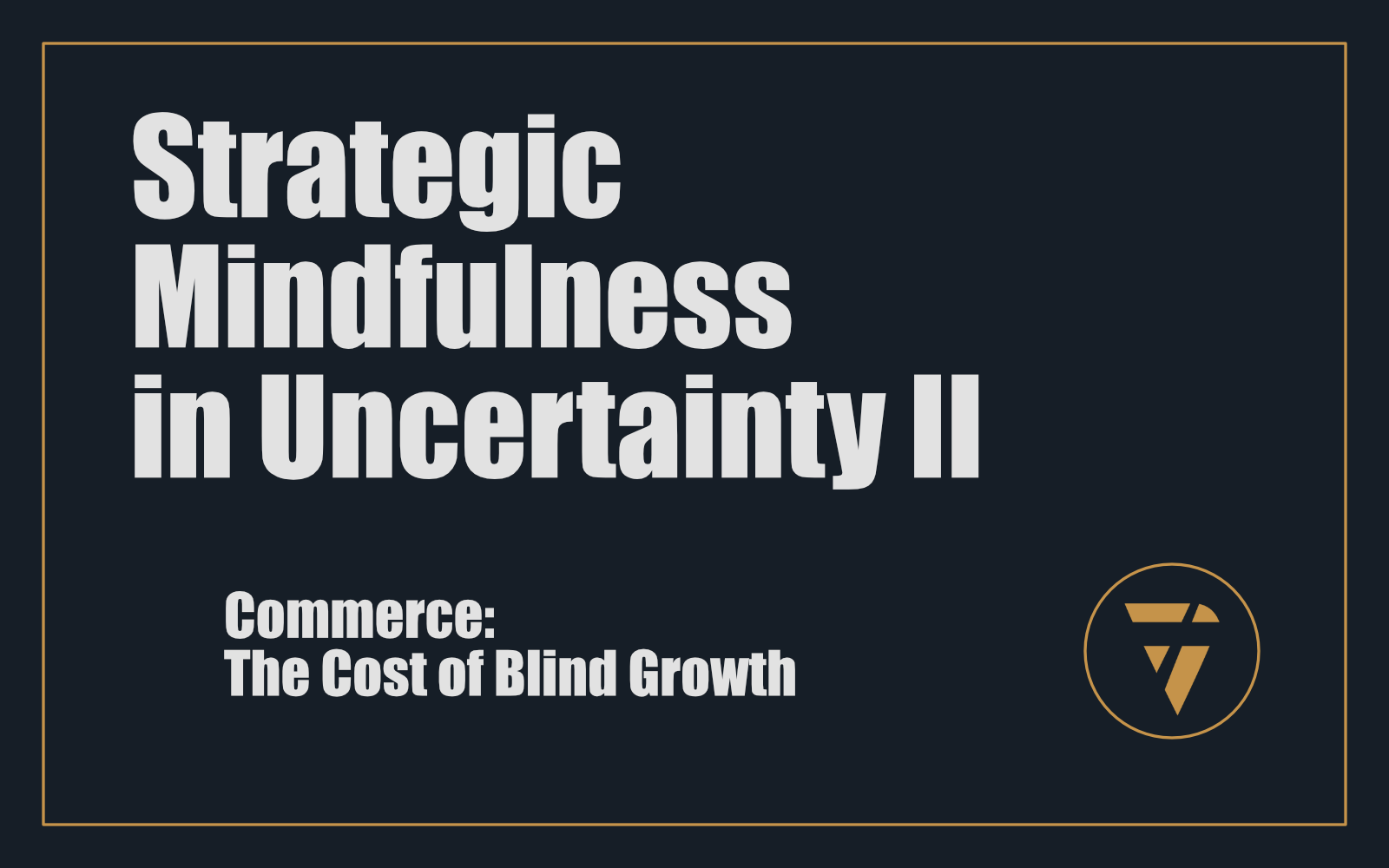Strategic Mindfulness in Uncertainty II

Commerce: The Cost of Blind Growth
Most businesses scale noise, not clarity.
It’s the hidden tragedy of the modern founder. They mistake motion for growth, speed for traction, attention for revenue. They obsess over visibility, vanity, and volume — and then wonder why, when the market turns volatile, their systems implode.
Commerce today doesn't punish the weak. It punishes the unmindful.
And here's the brutal truth: in volatile markets, speed without presence is suicide.
The Drift of Blind Growth
Every founder is taught to chase growth. It's the mantra of venture capital, the slogan of startup culture, the false religion of entrepreneurship.
“Grow fast or die.”
But blind growth is not growth. It's drift, accelerated.
You see it everywhere:
- Companies that raise millions, scale headcount, flood ad spend — and then collapse under their own weight.
- Startups that measure success by rounds closed, not revenue collected.
- Executives who celebrate “user numbers” without asking how many are paying, staying, or compounding value.
They confuse metrics with money. Visibility with viability. Speed with survival.
Blind growth is when a business builds momentum in the wrong direction. And in uncertainty, wrong direction equals extinction.
The Illusion of Scale
Scale is seductive. Investors love it. Founders crave it. But scale without clarity multiplies dysfunction.
If you scale noise, you scale confusion.
If you scale drift, you scale collapse.
If you scale illusion, you scale decay.
The mindful operator knows this. They refuse to scale what they cannot see clearly. They refuse to grow what does not compound. They refuse to mistake size for strength.
This is why strategic mindfulness belongs at the core of commerce. It's the discipline of compression — cutting through distortion until only reality remains. From that place, scale is no longer suicide. It becomes survival.
Presence as a Commercial Weapon
Presence is misunderstood. Too many think it means slowing down, pausing, or meditating before decisions. That’s self-help, not strategy.
Presence in commerce means ruthless awareness. The ability to see the truth of your business without distortion. To see what's working, what is failing, what's leaking — not as you hope it to be, not as your pitch deck presents it, but as it actually is.
Strategic mindfulness is the operator’s weapon because it deletes the illusions that blind everyone else:
- Vanity Metrics: Followers, impressions, downloads — meaningless without yield.
- Growth Theatre: New hires, new offices, new campaigns — cosmetic expansion with no compression of output.
- Investor Hype: Valuations built on storytelling, not systems.
The mindful founder cuts all of this away. They train themself and their team to see only what compounds: revenue, retention, yield-per-unit-of-effort.
That is presence. Not calm. Not retreat. Precision.
Speed Without Presence Is Suicide
The faster you go without clarity, the faster you die.
A business moving at speed without presence accelerates its own destruction. Every hire compounds dysfunction. Every campaign amplifies distortion. Every dollar raised multiplies drift.
This is why so many “fastest growing” companies are also the fastest collapsing. They built their acceleration on illusion.
Strategic mindfulness doesn’t slow you down. It compresses your focus so you can move faster in the right direction. It's not hesitation. It's alignment. It's speed that compounds instead of speed that corrodes.
In volatile markets, the unmindful founder races into collapse. The mindful founder compresses into clarity — and then moves with ruthless precision while competitors burn.
The Three Questions of Mindful Commerce
Every founder, operator, or executive should run these daily. They cut through noise and expose reality:
- Where is the revenue?
Not forecast. Not projection. Not investor deck. Actual, collected revenue. What is the yield of this system today? - Where is the retention?
Blind growth always leaks. If your churn exceeds your capture, you are not compounding — you are cannibalising. - Where is the yield per unit of effort?
For every cycle of energy, time, and capital — what did it return? Is it compounding, static, or decaying?
If you can't answer these with clarity, you're already drifting.
The Compression Audit
Mindful commerce requires deletion before acceleration. This is where the compression audit enters.
A compression audit is a ruthless weekly discipline:
- Identify one system leaking clarity.
- Expose whether it generates motion or money.
- Decide whether to delete, delegate, or deploy.
No vanity. No excuses. No sacred cows.
Run this every week for 90 days and you will expose the real architecture of your business. You will see what is compounding and what is corroding. And you will have the leverage to cut drift before it scales into dysfunction.
Most founders are too afraid to look. They prefer illusions that comfort over clarity that cuts. Which is why most collapse.
Case Study of Collapse
Look at WeWork. At Theranos. At FTX.
Different industries. Same pathology. Blind growth. Valuations scaled on illusion. Drift mistaken for destiny.
Every one of these companies ran on noise. They chased speed without presence. They scaled hype, not systems. And when volatility struck — when markets turned, when scrutiny landed — their architecture dissolved overnight.
They were never mindful. They never saw clearly. They were too busy scaling distortion.
And so they collapsed, loudly and spectacularly.
Case Study of Survival
Contrast this with Apple in 1997. Near bankruptcy. Irrelevant in the PC market. Bloated product lines. No direction.
Jobs returned and applied ruthless mindfulness: delete distortion, compress focus, cut drift. He axed 70% of products, slashed teams, compressed the entire business down to four quadrants. Clarity first. Compression first.
From that discipline came survival. From survival came leverage. From leverage came empire.
Strategic mindfulness saved Apple because it replaced blind growth with ruthless presence.
The lesson is clear: companies don't die from lack of opportunity. They die from lack of clarity.
The Operator’s Creed
The mindful operator holds this law:
- Do not scale noise.
- Do not accelerate drift.
- Do not confuse motion with money.
In volatile markets, survival belongs to those who compress.
Strategic mindfulness is not slowing down. It's cutting drift. It's deleting illusion. It's moving faster because you can see without distortion.
Blind growth will destroy you. Presence will preserve you. Compression will compound you.
And in uncertainty, that is the only edge that matters.
Consequence
Most businesses fail not because their idea was weak, but because their awareness was distorted. They did not see clearly. They scaled blind.
The cost of blind growth is collapse.
The consequence of mindful commerce is survival, leverage, and compounding clarity.
The choice is simple:
Scale noise and die.
Or compress into clarity and dominate.
In volatile markets, speed without presence is terminal. Strategic mindfulness is the only discipline left that converts drift into durable growth.
And those who install it will own the future.
This is what I’m working on. Tell me what you think, I enjoy the conversation! Subscribe and follow the work in real time.
Thanks!
B

Most businesses don’t scale growth. They scale drift. In volatile markets, speed without presence is terminal. Strategic mindfulness isn’t slowing down. It’s compression — cutting noise until only revenue remains.
PS -






